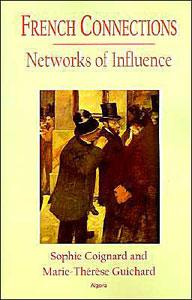Dr. Graciela Susana Boruszko teaches in the Department of International Studies and Languages, Seaver College, Pepperdine University, Malibu, California. She obtained her degree in French Philology from the University of Madrid. She also completed a D.E.A. in Comparative Literature Studies at the University of Dijon, France. Her areas of research are: Comparative Literature and Linguistics, Comparative Culture Studies, Hispanic Studies and French and Francophone Studies.
Elvira Doghem-Rashid is currently a doctoral research student at the Kings Institute for the Study of Public Policy (KISPP), King College London. Her thesis deals with the impact of the Race Relations (Amendment) Act (2000) on social mobility, specifically the effect of the Act on ethnic differences in educational attainment in the UK. She is also a member of the government’s Census Diversity Advisory Group and is one of the first members of Runnymede 360°, the UK’s leading independent race equality think tank. Her research interests are firmly rooted in the areas of ethnicity and multiculturalism, more recently termed social cohesion, with the Asian and Arab ethnic groups of particular interest in her research. These interests have also developed into an interest into ethno-religious differences and a focus on Muslim communities. During her research, she has worked on a number of research projects focussed on minority ethnic/racial groups and authored the UK’s first published report on the Halal Food Market (2000) published by Mintel. Outside of research, Elvira has a personal interest in promoting cultural engagement with the Arab community in the UK.
Aaron Fine received his BFA in Painting in 1993 from Ohio University in Athens, Ohio where he wrote a Philosophy honors thesis on Spinoza. Mr. Fine attended Claremont Graduate University in Los Angeles, where he studied art in an interdisciplinary environment, served as a humanities scholar, and received his MFA in Painting in 1996. In 1999 Aaron Fine accepted his current position as Professor of Art and Gallery Director at Truman State University in Kirksville Missouri. From May 2007 to August 2008 Mr. Fine was on sabbatical writing about pedagogy and pursuing a new body of work in mixed media drawing which can be seen at aaronfineart.com. Since then Mr. Fine has been adding more curatorial work and research into visual culture to his activities as a devoted academic.
Peter Fine is an Assistant Professor of Graphic Design at New Mexico State University. As a designer, artist and writer, he explores the role of the design past, present and future, seeking ways to integrate design history, theory and criticism with practice. He is currently exploring ways to make environmental concerns a vital component of the Graphic Design curriculum at NMSU. He continues work on his book Graphic Design Reconsidered an introduction to the subject of green design for students and professionals. In his course Visualizing Race students compare their DNA, personal identity and medium to understand how race and representation operate within Visual Culture. Fine received his MFA from the University of Arizona in 2004.
Dr. Michael Kilburn, former IREX scholar at the Institute for Contemporary History in Prague (1999), is Assistant Professor of Political Science and Liberal Studies at Endicott College in Beverly, Massachusetts. His research interests include human rights pedagogy, democratization, and the use of music and art in political advocacy. Kilburn is currently working on an English translation of Vanek’s environmental book No Breathing Room (1996). Dr. Kilburn has a lifelong mission to increase aw
areness of and engagement with politics and international affairs. He founded the Endicott Center for Oral History.
Dr. David Magill is Assistant Professor of English and Women and Gender Studies at Longwood University in Farmville, Virginia. He has published several essays in collections on masculinity and race in literature and popular culture. He is currently working on a manuscript entitled Modern Masculinities : Nostalgic White Manhood and Jazz Age Politics .
Dr. Heidi Rimke teaches in the Department of Sociology at The University of Winnipeg, Canada. She specializes in the areas of classical and contemporary social and political thought, historical and political sociology, criminology, cultural studies, the history of the philosophies of the social sciences, and the history of the human sciences with a focus on “psy” discourses and practices. Her publications examine the role of popular psychology/self-help in neo-liberalism; the history of psychiatry, the medicalization of morality; political biography; the history of criminal sciences; and anti-capitalist resistance movements. Some of her current projects examine the criminalization/pathologization of resistance; the psychiatrization of everyday life; the birth of psychopolitics and psychocentrism as neo-liberal political technologies; and, capitalism and cannibalism.
Harsha Walia is a community organizer and writer active in Metro Vancouver. She is a member of No One Is Illegal (NOII). No One Is Illegal-Vancouver, Coast Salish Territories is a grassroots anti-colonial migrant justice group with leadership from members of migrant and/or racialized backgrounds. As a movement for self-determination that challenges the ideology of immigration controls, NOII members are in full confrontation with Canadian border policies; denouncing and taking action to combat racial profiling, detention and deportation, the national security apparatus, law enforcement brutality, and exploitative working conditions of migrants. They struggle for the right of our communities to maintain their livelihoods and resist war, occupation, and displacement; while supporting indigenous sisters and brothers fighting theft of land and colonization. They also place themselves within the broader movement for global social justice that struggles against capitalism, militarism, oppression, poverty, imperialism, and other systems of domination and exploitation.













